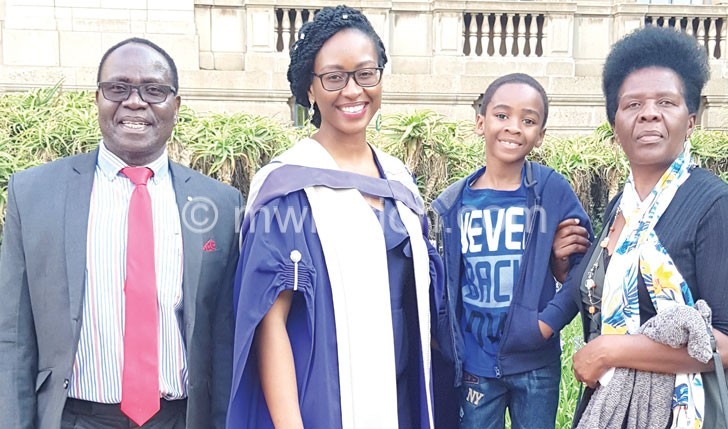Margaret Khonga – Malawi’s first female microbiologist
While most girls shun sciences for being too tough, Margaret Khonga is among the few who braved it.

At about eight years old, she recalls her father asking her and her two younger sisters what they wanted to be when they grew up.
Without even a second thought, Margaret said she wanted to be a medical doctor and claims her father prayed for God to fulfill their dreams.
“With that dream, I focused on the sciences throughout my primary and secondary education. My father also introduced me to the world that existed under the microscope when I was a child. I would visit him in his biology laboratory at Chancellor College where he lectured,” she explains.
However, she was only introduced to the world of microbiology while pursuing a degree at the University of Botswana where she was fascinated by how small organisms could wreak havoc on the human body.
Margaret was awarded a Bachelor of Science (biological sciences) degree from the University of Botswana in 2005 before returning to Malawi to pursue a medical degree at the Malawi College of Medicine.
Now aged 35, she confesses that the journey to becoming a medical doctor was not a walk in the park, but thanks to resilience, she is now the first female medical microbiologist the country has ever had.
After obtaining her Bachelor of Medicine Bachelor of Surgery (MBBS) degree in 2010 and completing her internship at Queen Elizabeth Central Hospital (QECH) in Blantyre, she joined the Pathology Division at the College of Medicine as an assistant lecturer in the medical microbiology department in 2012.
She later moved to Cape Town, South Africa in 2015 to specialise in medical microbiology at the University of Cape Town where she recently graduated as a medical microbiologist in October 2018.
“It is the fulfillment of a goal achieved ever since I started my graduate training. I am excited about the prospect of contributing knowledge and clinical skills to the academic and medical fraternity,” she explains when asked how it feels.
She describes microbiology as the scientific study of microscopic organisms such as bacteria, viruses, parasites and fungi which cannot be seen with the naked eye.
“Medical [or clinical] microbiology is a branch of medical science concerned with the diagnosis, treatment and prevention of infectious diseases. It is also the study of the micro-organisms that cause human diseases,” she explains.
A medical microbiologist has various roles within the hospital and community such as advising clinicians on the likely infection causes and the best tests to diagnose infection in a patient.
She points out that a medical microbiologist does not work directly with patients, but liaises with clinical colleagues in the hospital and laboratory.
With many personal hardships to overcome along the way, Margaret says the woman she has become has also been moulded by her son.
As a single parent, she admits it is a lot tougher to juggle career and motherhood.
“He has been a strong motivation in pushing me to work hard and make sacrifices for great reward in the future,” she says.
Nonetheless, she considers it a blessing to be born into a Christian family that believes in the importance of education and Christian values.
“My maternal grandfather, Reverend G.A. Kachaje was a strong believer in education. He was interested in our school grades every term. When I told him of my decision to become a medical doctor, he made sure I knew what I was getting myself into and of the sacrifices that would have to be made to achieve my goal. From then on, he called me ‘doctor’,” she explains.
Born on May 8 1983 in Zomba, the doctor is the first born daughter to Professor Elenimo Khonga and Alepha Khonga. She has two younger sisters, Mphatso, Shubila and is mother to a seven-year-old son.
Margaret spent the first four years of her life in Canada while her father pursued his PhD in plant pathology. Her next nine years were spent in Zomba where she attended Zomba Private Primary School while her father worked as a lecturer at Chancellor College. Her mother was in human resources at the Malawi National Examinations Board (Maneb).
Her family moved to Gaborone, Botswana in 1996 when her father started lecturing at the Botswana College of Agriculture (now called Botswana University of Agriculture and Natural Resources).
Margaret went to Moselewapula Community Junior Secondary School (1996 -1998) and Ledumang Senior Secondary School (1999- 2000).
To the young girl out there, she says: “If science challenges, intrigues and motivates you; if it is what you are willing to sacrifice pleasures for, then I encourage you to embark on this journey of becoming a medical doctor. The medical profession is a field that has a lot of challenges and obstacles. It is a life long journey of constant learning which requires a lot of determination, sacrifice and delayed gratification,” she says.
Evoking the words of her grandfather, Khonga points out that there is a big difference between an honorary degree and a degree one gets after passing exams.
She says: “It was and still is God’s plan that man must go through these stages. These stages are not meant to scare us, but help us prove that we are God’s children when we pass the tests.”
Ultimately, she notes that it is good to have mentors or role models who can guide and encourage one as they work towards their goals and achieving their dreams.





